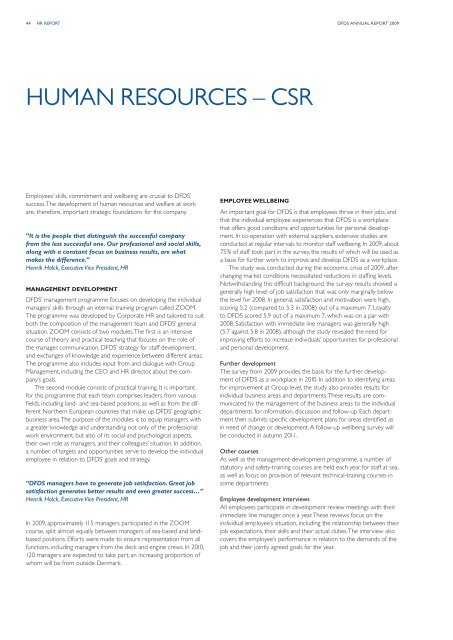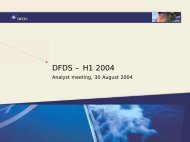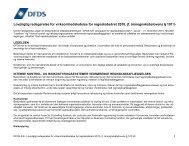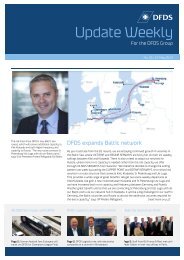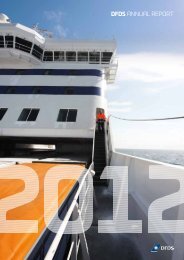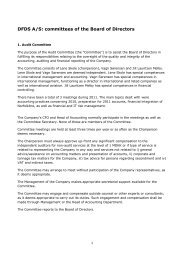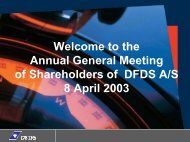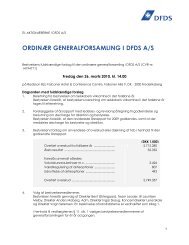English - DFDS
English - DFDS
English - DFDS
Create successful ePaper yourself
Turn your PDF publications into a flip-book with our unique Google optimized e-Paper software.
44<br />
HR REport<br />
<strong>DFDS</strong> annual report 2009<br />
Human Resources – CSR<br />
Employees’ skills, commitment and wellbeing are crucial to <strong>DFDS</strong>’<br />
success. The development of human resources and welfare at work<br />
are, therefore, important strategic foundations for the company.<br />
“It is the people that distinguish the successful company<br />
from the less successful one. Our professional and social skills,<br />
along with a constant focus on business results, are what<br />
makes the difference.”<br />
Henrik Holck, Executive Vice President, HR<br />
Management development<br />
<strong>DFDS</strong>’ management programme focuses on developing the individual<br />
managers’ skills through an internal training program called ZOOM.<br />
The programme was developed by Corporate HR and tailored to suit<br />
both the composition of the management team and <strong>DFDS</strong>’ general<br />
situation. ZOOM consists of two modules. The first is an intensive<br />
course of theory and practical teaching that focuses on the role of<br />
the manager, communication, <strong>DFDS</strong>’ strategy for staff development,<br />
and exchanges of knowledge and experience between different areas.<br />
The programme also includes input from and dialogue with Group<br />
Management, including the CEO and HR director, about the company’s<br />
goals.<br />
The second module consists of practical training. It is important<br />
for this programme that each team comprises leaders from various<br />
fields, including land- and sea-based positions, as well as from the different<br />
Northern European countries that make up <strong>DFDS</strong>’ geographic<br />
business area. The purpose of the modules is to equip managers with<br />
a greater knowledge and understanding not only of the professional<br />
work environment, but also of its social and psychological aspects,<br />
their own role as managers, and their colleagues’ situation. In addition,<br />
a number of targets and opportunities serve to develop the individual<br />
employee in relation to <strong>DFDS</strong>’ goals and strategy.<br />
“<strong>DFDS</strong> managers have to generate job satisfaction. Great job<br />
satisfaction generates better results and even greater success…”<br />
Henrik Holck, Executive Vice President, HR<br />
In 2009, approximately 115 managers participated in the ZOOM<br />
course, split almost equally between managers of sea-based and landbased<br />
positions. Efforts were made to ensure representation from all<br />
functions, including managers from the deck and engine crews. In 2010,<br />
120 managers are expected to take part, an increasing proportion of<br />
whom will be from outside Denmark.<br />
Employee wellbeing<br />
An important goal for <strong>DFDS</strong> is that employees thrive in their jobs, and<br />
that the individual employee experiences that <strong>DFDS</strong> is a workplace<br />
that offers good conditions and opportunities for personal development.<br />
In co-operation with external suppliers, extensive studies are<br />
conducted at regular intervals to monitor staff wellbeing. In 2009, about<br />
75 % of staff took part in the survey, the results of which will be used as<br />
a basis for further work to improve and develop <strong>DFDS</strong> as a workplace.<br />
The study was conducted during the economic crisis of 2009, after<br />
changing market conditions necessitated reductions in staffing levels.<br />
Notwithstanding this difficult background, the survey results showed a<br />
generally high level of job satisfaction that was only marginally below<br />
the level for 2008. In general, satisfaction and motivation were high,<br />
scoring 5.2 (compared to 5.3 in 2008) out of a maximum 7. Loyalty<br />
to <strong>DFDS</strong> scored 5.9 out of a maximum 7, which was on a par with<br />
2008. Satisfaction with immediate line managers was generally high<br />
(5.7 against 5.8 in 2008), although the study revealed the need for<br />
improving efforts to increase individuals’ opportunities for professional<br />
and personal development.<br />
Further development<br />
The survey from 2009 provides the basis for the further development<br />
of <strong>DFDS</strong> as a workplace in 2010. In addition to identifying areas<br />
for improvement at Group level, the study also provides results for<br />
individual business areas and departments. These results are communicated<br />
by the management of the business areas to the individual<br />
departments for information, discussion and follow-up. Each department<br />
then submits specific development plans for areas identified as<br />
in need of change or development. A follow-up wellbeing survey will<br />
be conducted in autumn 2011.<br />
Other courses<br />
As well as the management-development programme, a number of<br />
statutory and safety-training courses are held each year for staff at sea,<br />
as well as focus on provision of relevant technical-training courses in<br />
some departments.<br />
Employee development interviews<br />
All employees participate in development review meetings with their<br />
immediate line manager once a year. These reviews focus on the<br />
individual employee’s situation, including the relationship between their<br />
job expectations, their skills and their actual duties. The interview also<br />
covers the employee’s performance in relation to the demands of the<br />
job and their jointly agreed goals for the year.


